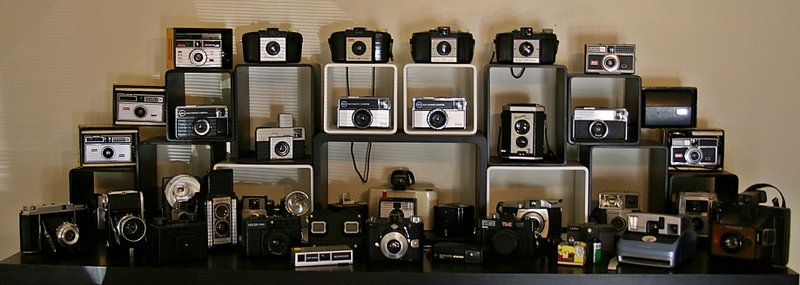On Wabi-Sabi Weekends, I post excerpts from my book, Simply Imperfect: Revisiting the Wabi-Sabi House.

Take a look at yourself through the lens of your collections. Photo from Vintage Indie
“Every possession is a symbol of the self.” —Georg Simmel
We Westerners struggle mightily with stuff. Every year, books full of advice on uncluttering and organizing are published; websites and newspapers revisit the subject regularly. Nothing sells magazines better than cover blurbs promising to help readers unclutter.
According to the Self Storage Association, the average person owns four and a half tons of material goods, including clothing, accessories, appliances and furniture. Experts say that most of us have 25 percent more furniture and 75 percent more toys than we need. Professional organizer Julie Morgenstern asserts that we use only about 20 percent of what we own; the rest is simply clutter. “Tangible clutter is anything that creates stress because of its appearance, condition, location, arrangement, and/or quantity,” states organizing expert Harriet Schechter. “Having too much of a good thing can create just as much clutter as keeping lots of not-so-good things.”
“We live in a cluttered world,” Dr. Jerrold Pollak, a Portsmouth, New Hampshire, psychologist who studies obsessive/compulsive behavior including excessive shopping, hoarding and collecting, said in the Atlanta Journal-Constitution. “We get more mail, we get more magazines, we have the opportunity to buy more things. One hundred years ago, you couldn’t have bought 200 pairs of shoes if you wanted to. Now you can get that in an afternoon.”
We buy more stuff because we can.
“For the overwhelming majority of Americans, an important part of living the good life simply means ‘more,’” trend watcher Daniel Yankelovich said way back in 1979, just before big-box superstores overwhelmed the retail marketplace and trained shoppers to buy more (cheaper) stuff made overseas.
Surrounding ourselves with material goods proves that we’ve made it and makes us feel safe. We show the world—and ourselves—who we are through what we amass, the souvenirs of foreign lands, the beacons of good taste. We assert we’re fanciful by collecting Wizard of Oz memorabilia, intellectually curious through shelves of books, discerning by the art we choose.
In their study “The Meaning of Things: Domestic Symbols of the Self,” sociologists Mihaly Csikszentmihalyi and Eugene Rochberg-Halton found that most people find more meaning in a battered toy, an old musical instrument or an heirloom quilt than they do in expensive appliances. They find extensions of themselves in these things, and they actually look to them as reflections of who they are and what they can become. We seek out and hold dear items that resonate with us because they act as symbols of ourselves.
One Response to Wabi-Sabi Weekend: Our Stuff is Us